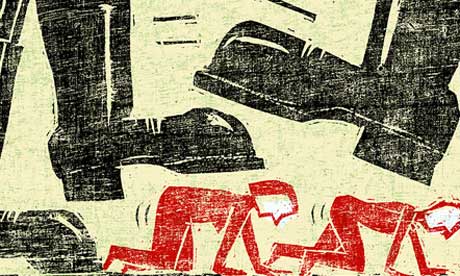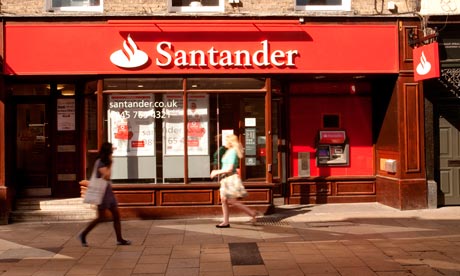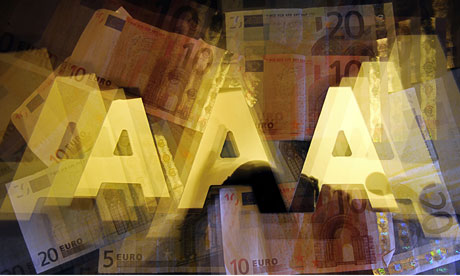The spirit of dictators like Ceausescu is finding new life in the response of the European elite to pressures in the eurozone

Nicolae Ceausescu
addresses Romania's Communist party congress in November 1989, shortly
before he was deposed and executed. Photograph: Gerard Fouet/AFP
In one of the last interviews before his fall, Nicolae Ceausescu
was asked by a western journalist how he justified the fact that
Romanian citizens could not travel freely abroad although freedom of
movement was guaranteed by the constitution. His answer was in the best
tradition of Stalinist sophistry: true, the constitution guarantees
freedom of movement, but it also guarantees the right to a safe,
prosperous home. So we have here a potential conflict of rights: if
Romanian citizens were to be allowed to leave the country, the
prosperity of their homeland would be threatened. In this conflict, one
has to make a choice, and the right to a prosperous, safe homeland
enjoys clear priority …
It seems that this same spirit is alive and well in Slovenia today. Last month the constitutional court found that a referendum on legislation to set up a "bad bank" and a sovereign holding would be unconstitutional – in effect banning a popular vote on the matter. The referendum was proposed by trade unions challenging the government's neoliberal economic politics, and the proposal got enough signatures to make it obligatory.
The idea of the "bad bank" was of a place to transfer all bad credit from main banks, which would then be salvaged by state money (ie at taxpayers' expense), so preventing any serious inquiry into who was responsible for this bad credit in the first place. This measure, debated for months, was far from being generally accepted, even by financial specialists. So why prohibit the referendum? In 2011, when George Papandreou's government in Greece proposed a referendum on austerity measures, there was panic in Brussels, but even there no one dared to directly prohibit it.
According to the Slovenian constitutional court, the referendum "would have caused unconstitutional consequences". How? The court conceded a constitutional right to a referendum, but claimed that its execution would endanger other constitutional values that should be given priority in an economic crisis: the efficient functioning of the state apparatus, especially in creating conditions for economic growth; the realisation of human rights, especially the rights to social security and to free economic initiative.
In short, in assessing the consequences of the referendum, the court simply accepted as fact that failing to obey the dictates of international financial institutions (or to meet their expectations) can lead to political and economic crisis, and is thus unconstitutional. To put it bluntly: since meeting these dictates and expectations is the condition of maintaining the constitutional order, they have priority over the constitution (and eo ipso state sovereignty).
Slovenia may be a small country, but this decision is a symptom of a global tendency towards the limitation of democracy. The idea is that, in a complex economic situation like today's, the majority of the people are not qualified to decide – they are unaware of the catastrophic consequences that would ensue if their demands were to be met. This line of argument is not new. In a TV interview a couple of years ago, the sociologist Ralf Dahrendorf linked the growing distrust for democracy to the fact that, after every revolutionary change, the road to new prosperity leads through a "valley of tears". After the breakdown of socialism, one cannot directly pass to the abundance of a successful market economy: limited, but real, socialist welfare and security have to be dismantled, and these first steps are necessarily painful. The same goes for western Europe, where the passage from the post-second world war welfare state to new global economy involves painful renunciations, less security, less guaranteed social care. For Dahrendorf, the problem is encapsulated by the simple fact that this painful passage through the "valley of tears" lasts longer than the average period between elections, so that the temptation is great to postpone the difficult changes for the short-term electoral gains.
For him, the paradigm here is the disappointment of the large strata of post-communist nations with the economic results of the new democratic order: in the glorious days of 1989, they equated democracy with the abundance of western consumerist societies; and 20 years later, with the abundance still missing, they now blame democracy itself.
Unfortunately, Dahrendorf focuses much less on the opposite temptation: if the majority resist the necessary structural changes in the economy, would one of the logical conclusions not be that, for a decade or so, an enlightened elite should take power, even by non-democratic means, to enforce the necessary measures and thus lay the foundations for truly stable democracy?
Along these lines, the journalist Fareed Zakaria pointed out how democracy can only "catch on" in economically developed countries. If developing countries are "prematurely democratised", the result is a populism that ends in economic catastrophe and political despotism – no wonder that today's economically most successful third world countries (Taiwan, South Korea, Chile) embraced full democracy only after a period of authoritarian rule. And, furthermore, does this line of thinking not provide the best argument for the authoritarian regime in China?
What is new today is that, with the financial crisis that began in 2008, this same distrust of democracy – once constrained to the third world or post-communist developing countries – is gaining ground in the developed west itself: what was a decade or two ago patronising advice to others now concerns ourselves.
The least one can say is that this crisis offers proof that it is not the people but experts themselves who do not know what they are doing. In western Europe we are effectively witnessing a growing inability of the ruling elite – they know less and less how to rule. Look at how Europe is dealing with the Greek crisis: putting pressure on Greece to repay debts, but at the same time ruining its economy through imposed austerity measures and thereby making sure that the Greek debt will never be repaid.
At the end of October last year, the IMF itself released research showing that the economic damage from aggressive austerity measures may be as much as three times larger than previously assumed, thereby nullifying its own advice on austerity in the eurozone crisis. Now the IMF admits that forcing Greece and other debt-burdened countries to reduce their deficits too quickly would be counterproductive, but only after hundreds of thousands of jobs have been lost because of such "miscalculations".
And therein resides the true message of the "irrational" popular protests all around Europe: the protesters know very well what they don't know; they don't pretend to have fast and easy answers; but what their instinct is telling them is nonetheless true – that those in power also don't know it. In Europe today, the blind are leading the blind.
It seems that this same spirit is alive and well in Slovenia today. Last month the constitutional court found that a referendum on legislation to set up a "bad bank" and a sovereign holding would be unconstitutional – in effect banning a popular vote on the matter. The referendum was proposed by trade unions challenging the government's neoliberal economic politics, and the proposal got enough signatures to make it obligatory.
The idea of the "bad bank" was of a place to transfer all bad credit from main banks, which would then be salvaged by state money (ie at taxpayers' expense), so preventing any serious inquiry into who was responsible for this bad credit in the first place. This measure, debated for months, was far from being generally accepted, even by financial specialists. So why prohibit the referendum? In 2011, when George Papandreou's government in Greece proposed a referendum on austerity measures, there was panic in Brussels, but even there no one dared to directly prohibit it.
According to the Slovenian constitutional court, the referendum "would have caused unconstitutional consequences". How? The court conceded a constitutional right to a referendum, but claimed that its execution would endanger other constitutional values that should be given priority in an economic crisis: the efficient functioning of the state apparatus, especially in creating conditions for economic growth; the realisation of human rights, especially the rights to social security and to free economic initiative.
In short, in assessing the consequences of the referendum, the court simply accepted as fact that failing to obey the dictates of international financial institutions (or to meet their expectations) can lead to political and economic crisis, and is thus unconstitutional. To put it bluntly: since meeting these dictates and expectations is the condition of maintaining the constitutional order, they have priority over the constitution (and eo ipso state sovereignty).
Slovenia may be a small country, but this decision is a symptom of a global tendency towards the limitation of democracy. The idea is that, in a complex economic situation like today's, the majority of the people are not qualified to decide – they are unaware of the catastrophic consequences that would ensue if their demands were to be met. This line of argument is not new. In a TV interview a couple of years ago, the sociologist Ralf Dahrendorf linked the growing distrust for democracy to the fact that, after every revolutionary change, the road to new prosperity leads through a "valley of tears". After the breakdown of socialism, one cannot directly pass to the abundance of a successful market economy: limited, but real, socialist welfare and security have to be dismantled, and these first steps are necessarily painful. The same goes for western Europe, where the passage from the post-second world war welfare state to new global economy involves painful renunciations, less security, less guaranteed social care. For Dahrendorf, the problem is encapsulated by the simple fact that this painful passage through the "valley of tears" lasts longer than the average period between elections, so that the temptation is great to postpone the difficult changes for the short-term electoral gains.
For him, the paradigm here is the disappointment of the large strata of post-communist nations with the economic results of the new democratic order: in the glorious days of 1989, they equated democracy with the abundance of western consumerist societies; and 20 years later, with the abundance still missing, they now blame democracy itself.
Unfortunately, Dahrendorf focuses much less on the opposite temptation: if the majority resist the necessary structural changes in the economy, would one of the logical conclusions not be that, for a decade or so, an enlightened elite should take power, even by non-democratic means, to enforce the necessary measures and thus lay the foundations for truly stable democracy?
Along these lines, the journalist Fareed Zakaria pointed out how democracy can only "catch on" in economically developed countries. If developing countries are "prematurely democratised", the result is a populism that ends in economic catastrophe and political despotism – no wonder that today's economically most successful third world countries (Taiwan, South Korea, Chile) embraced full democracy only after a period of authoritarian rule. And, furthermore, does this line of thinking not provide the best argument for the authoritarian regime in China?
What is new today is that, with the financial crisis that began in 2008, this same distrust of democracy – once constrained to the third world or post-communist developing countries – is gaining ground in the developed west itself: what was a decade or two ago patronising advice to others now concerns ourselves.
The least one can say is that this crisis offers proof that it is not the people but experts themselves who do not know what they are doing. In western Europe we are effectively witnessing a growing inability of the ruling elite – they know less and less how to rule. Look at how Europe is dealing with the Greek crisis: putting pressure on Greece to repay debts, but at the same time ruining its economy through imposed austerity measures and thereby making sure that the Greek debt will never be repaid.
At the end of October last year, the IMF itself released research showing that the economic damage from aggressive austerity measures may be as much as three times larger than previously assumed, thereby nullifying its own advice on austerity in the eurozone crisis. Now the IMF admits that forcing Greece and other debt-burdened countries to reduce their deficits too quickly would be counterproductive, but only after hundreds of thousands of jobs have been lost because of such "miscalculations".
And therein resides the true message of the "irrational" popular protests all around Europe: the protesters know very well what they don't know; they don't pretend to have fast and easy answers; but what their instinct is telling them is nonetheless true – that those in power also don't know it. In Europe today, the blind are leading the blind.









